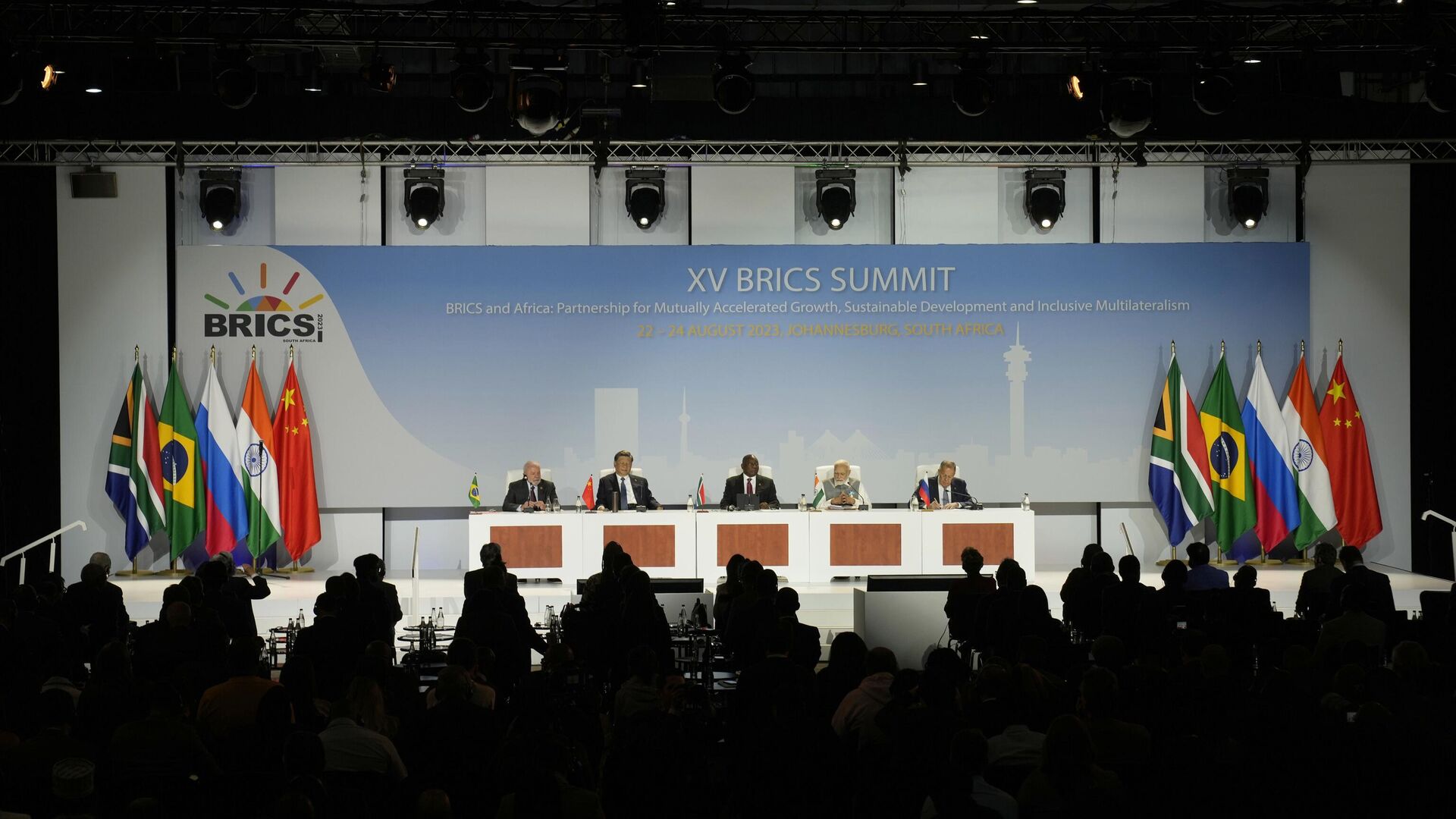https://sputniknews.in/20240530/assessing-potential-impact-of-south-africas-elections-on-brics-7480483.html
Assessing Potential Impact of South Africa's Elections on BRICS
Assessing Potential Impact of South Africa's Elections on BRICS
Sputnik India
The outcome of the South African polls is not expected to alter the country's stance on BRICS, irrespective of any alliances the ANC forms with parties such as... 30.05.2024, Sputnik India
2024-05-30T19:28+0530
2024-05-30T19:28+0530
2024-05-30T19:28+0530
india
south africa
russia
brics
un security council (unsc)
government of india
indian ocean
ministry of external affairs (mea)
russian economy
https://cdn1.img.sputniknews.in/img/07e8/01/04/6091172_0:160:3072:1888_1920x0_80_0_0_0dcbb082133f7e0f7388b8cf9e12c6a8.jpg
South Africans are participating in a highly contested election on Wednesday, marking the most competitive vote since the apartheid era. Early indications from opinion polls suggest that the governing African National Congress (ANC) could lose its parliamentary majority after three decades in power.Queues began to form early in the morning in major urban centres such as Johannesburg, Cape Town, and Durban, with similar scenes observed in township outskirts and rural regions, despite the chilly morning temperatures.Under the leadership of Nelson Mandela, the ANC secured victory in South Africa's first multi-racial election in 1994, subsequently maintaining a majority in national elections held every five years thereafter, albeit with a gradual decrease in support.South Africa's ambassador to Russia, Mzuvukile Jeff Maqetuka, suggested that if the right-wing opposition were to ascend to power following the presidential elections, South Africa might reconsider its foreign policy stance and exit BRICS, mirroring Argentina's previous departure, according to media.Speculation regarding a possible alteration in South Africa's foreign policy trajectory has surfaced, with potential ramifications for its involvement in BRICS.Potential Coalition Government & Policy Continuity in South AfricaIn either scenario, he added that it is anticipated President Cyril Ramaphosa will retain his presidency, suggesting continuity in the broad foreign policy direction with potential adjustments. South Africa has historically maintained close ties with Russia and is a significant strategic partner for India.Meanwhile, Bhatia pointed out that it is reasonable to assume that close consultations between Pretoria and Moscow have occurred, with India naturally having a stake in the process, having played a supportive role in the expansion of BRICS.Additionally, he noted that discussions are centred on bolstering BRICS economic unity through de-dollarisation efforts without resorting to a shared currency, and reforming the multilateral system, particularly advocating for the reform and enlargement of the UN Security Council to include countries like India, South Africa, and Brazil.South Africa has maintained a steadfast policy of supporting Africa both politically and economically, a commitment that is likely to persist regardless of the incoming government.At the same time, Beri emphasised that this focus on Africa is expected to endure, "paving the way for potential cooperation initiatives between India, South Africa, Russia and other African nations."Development cooperation has been a cornerstone of India's engagement with Africa, emphasising the importance of developmental initiatives as a key aspect of India's Africa policy, she added.
https://sputniknews.in/20240529/thailand-sets-sights-on-becoming-first-southeast-asian-brics-member-7474318.html
india
south africa
russia
indian ocean
Sputnik India
feedback.hindi@sputniknews.com
+74956456601
MIA „Rossiya Segodnya“
2024
Swapna Nair
https://cdn1.img.sputniknews.in/img/07e7/09/12/4320104_0:0:681:681_100x100_80_0_0_ca8a7d4d582609272840ffdd1cde7278.jpg
Swapna Nair
https://cdn1.img.sputniknews.in/img/07e7/09/12/4320104_0:0:681:681_100x100_80_0_0_ca8a7d4d582609272840ffdd1cde7278.jpg
News
en_IN
Sputnik India
feedback.hindi@sputniknews.com
+74956456601
MIA „Rossiya Segodnya“
Sputnik India
feedback.hindi@sputniknews.com
+74956456601
MIA „Rossiya Segodnya“
Swapna Nair
https://cdn1.img.sputniknews.in/img/07e7/09/12/4320104_0:0:681:681_100x100_80_0_0_ca8a7d4d582609272840ffdd1cde7278.jpg
south africans, election, electoral battle, apartheid era, african national congress (anc), parliamentary majority power, johannesburg, cape town, and durban nelson mandela, south africa's, multi-racial election, national elections, south africa, russia, mzuvukile jeff maqetuka , south africa, foreign policy, brics, argentina's, foreign policy, brics, south africa's ambassador to russia, mzuvukile jeff maqetuka, african national congress, ambassador rajiv bhatia (retd), gateway house, cii’s international advisory council, trade policy council and africa committee, president ramaphosa, foreign policy, economic freedom fighters (eff), mk party, south africa', brics, ruchita beri, former president of african studies association of india (asa), south africa's, multilateral system,un security council, india, south africa, and brazil’
south africans, election, electoral battle, apartheid era, african national congress (anc), parliamentary majority power, johannesburg, cape town, and durban nelson mandela, south africa's, multi-racial election, national elections, south africa, russia, mzuvukile jeff maqetuka , south africa, foreign policy, brics, argentina's, foreign policy, brics, south africa's ambassador to russia, mzuvukile jeff maqetuka, african national congress, ambassador rajiv bhatia (retd), gateway house, cii’s international advisory council, trade policy council and africa committee, president ramaphosa, foreign policy, economic freedom fighters (eff), mk party, south africa', brics, ruchita beri, former president of african studies association of india (asa), south africa's, multilateral system,un security council, india, south africa, and brazil’
Assessing Potential Impact of South Africa's Elections on BRICS
The outcome of the South African polls is not expected to alter the country's stance on BRICS, irrespective of any alliances the ANC forms with parties such as the Economic Freedom Fighters (EFF) or the MK Party, according to experts.
South Africans are participating in a highly contested election on Wednesday, marking the most competitive vote since the apartheid era. Early indications from opinion polls suggest that the governing African National Congress (ANC) could lose its parliamentary majority after three decades in power.
Queues began to form early in the morning in major urban centres such as Johannesburg, Cape Town, and Durban, with similar scenes observed in township outskirts and rural regions, despite the chilly morning temperatures.
Under the leadership of Nelson Mandela, the ANC secured victory in South Africa's first multi-racial election in 1994, subsequently maintaining a majority in national elections held every five years thereafter, albeit with a gradual decrease in support.
South Africa's ambassador to Russia, Mzuvukile Jeff Maqetuka, suggested that if the right-wing opposition were to ascend to power following the presidential elections, South Africa might reconsider its foreign policy stance and exit BRICS, mirroring Argentina's previous departure, according to media.
Speculation regarding a possible alteration in South Africa's foreign policy trajectory has surfaced, with potential ramifications for its involvement in BRICS.
Potential Coalition Government & Policy Continuity in South Africa
"South Africa is at a critical juncture with the upcoming election, where the outcome will determine whether the African National Congress can maintain its majority of over 50% and govern independently, or if it will fall short of this threshold, necessitating coalition-building with smaller political parties", Ambassador Rajiv Bhatia (retd.), a distinguished fellow at Gateway House and member CII’s International Advisory Council, Trade Policy Council, and Africa Committee, said in conversation with Sputnik India.
In either scenario, he added that it is anticipated President Cyril Ramaphosa will retain his presidency, suggesting continuity in the
broad foreign policy direction with potential adjustments.
South Africa has historically maintained close ties with Russia and is a significant strategic partner for India.
"The forecasts suggest the likelihood of a coalition government forming, raising uncertainties about the continuity of the current government's policies thereafter. Despite potential alliances with parties like the Economic Freedom Fighters (EFF) or the MK Party, it seems improbable that South Africa's stance on BRICS will undergo any significant changes", Ruchita Beri, former president of the African Studies Association of India (ASA), told Sputnik India.
Meanwhile, Bhatia pointed out that it is reasonable to assume that close consultations between Pretoria and Moscow have occurred, with India naturally having a stake in the process, having played a supportive role in the expansion of BRICS.
"[BRICS serves] as a significant unifying force, providing a shared platform for collaborative efforts among its member countries", according to Bhatia. "South Africa's recent chairmanship of the intergovernmental organisation particularly highlighted during the transformative Johannesburg Summit, yielded historic decisions such as the expansion of BRICS membership, a responsibility now passed to Russia".
Additionally, he noted that discussions are centred on bolstering BRICS economic unity through de-dollarisation efforts without resorting to a shared currency, and
reforming the multilateral system, particularly advocating for the reform and enlargement of the UN Security Council to include countries like India, South Africa, and Brazil.
"These dialogues will heavily influence the trajectory of BRICS", the former ambassador said. "[Thus], the outcomes of the ongoing elections, particularly regarding the ANC's ability to secure a majority or near majority, will play a pivotal role in shaping these discussions".
South Africa has maintained a steadfast policy of supporting Africa both politically and economically, a commitment that is likely to persist regardless of the incoming government.
At the same time, Beri emphasised that this focus on Africa is expected to endure, "paving the way for potential cooperation initiatives between India, South Africa, Russia and other African nations."
Development cooperation has been a cornerstone of India's engagement with Africa, emphasising the importance of developmental initiatives as a key aspect of India's Africa policy, she added.



